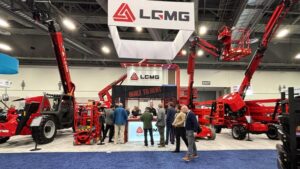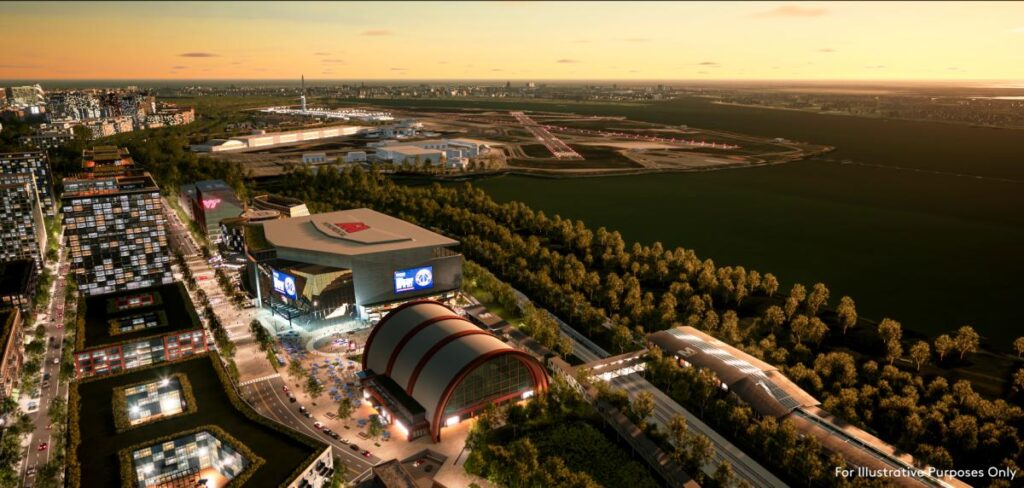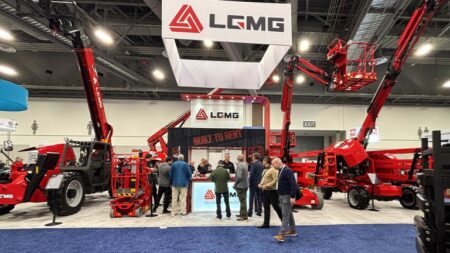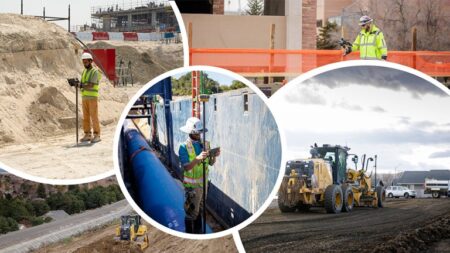A rendering of the proposed arena where the Wizards and Capitals would play in Alexandria. (JBG Smith rendering)
The owner of the Washington, D.C., pro basketball and hockey teams has reached a nonbinding agreement to move the teams from the city’s downtown to a future arena in northern Virginia as soon as 2028, shaking the regional sports landscape and teeing up sharp debate among local and state lawmakers who could make or break the deal.
Republican Virginia Gov. Glenn Youngkin and Ted Leonsis, owner of Monumental Sports & Entertainment, announced the proposal Dec. 13 standing on a dirt lot in Alexandria’s Potomac Yard neighborhood where they hope to build a $2 billion, 12-acre mixed-use complex will rise to house the NBA’s Wizards and the NHL’s Capitals.
While no official deal has been signed, Youngkin said he felt confident enough to join Leonsis and others in making the details public.
“This is the exact same process we undertook with HQ2,” Youngkin said, referring to Amazon’s East Coast headquarters in nearby Arlington County. “It’s an agreement — a very formal handshake and understanding.”
The proposal faces multiple hurdles at the state and local level with District leaders pledging to continue their efforts to retain the NBA and NHL teams and Virginia lawmakers on both sides of the aisle questioning whether officials should be focused on wooing a billionaire sports team owner to further develop a well-resourced corner of the state.
Two aides to Youngkin who spoke to the Washington Post on the condition of anonymity to share confidential details of the plan said Virginia would contribute $150 million to $200 million in transportation improvements for the project and issue $1.4 billion in bonds through a newly created sports and entertainment authority.
The bonds would be repaid over 40 years, in part with a portion of tax revenue generated from the first phase of the project, arena parking revenue and annual rent paid by Monumental. The governor’s aides said terms of the 40-year lease were still being negotiated.
Renderings provided by Monumental show a 20,000-seat arena, practice facilities for the Wizards and Capitals, expanded esports facilities, a “fan plaza” and a performing arts venue, in addition to Monumental’s global corporate headquarters and a Monumental Sports Network studio.
Under the deal, Bethesda-based developer JBG Smith would sell the Potomac Yard land it owns to a Virginia stadium authority, which would lease the property to Monumental. The stadium authority would issue bonds for the project, allowing the developer to leverage below-market state and municipal interest rates.
In addition to being located next to the Potomac Yard Metro station, which is serviced by the Blue and Yellow lines, the facility would be just south of the graduate “innovation campus” that Virginia Tech is set to open next year.
Stephanie Landrum, president and CEO of the Alexandria Economic Development Partnership, said the Potomac Yard area would become “a world-class entertainment district” active for 18 hours a day, 365 days a year.
The development’s announcement “is very much the first step in a lengthy process,” she said.
If Deal Is Signed, Northern Virginia Gets Another Big Boost
If Monumental ultimately moves the Capitals and Wizards to Virginia, it would mark a major economic development win for Youngkin and the city of Alexandria and deal a blow to D.C.’s struggling downtown.
Monumental’s arrangement with Virginia does not prohibit it from continuing to negotiate with D.C. to rehabilitate Capital One Arena, which opened in 1997. D.C. Mayor Muriel E. Bowser (D) made an 11th-hour attempt to retain the teams prior to the announcement from Youngkin and Leonsis, offering $500 million in public funds that she said represented the District’s “best and final offer.”
Youngkin said Monumental’s upfront contribution to the project will be “more than $400 million.” The plan would ultimately allow the company to control two local arenas for live entertainment and boost the number of events it could host per year. Unlike the moneymaking entertainment district the Atlanta Braves have opened in suburban Cobb County, Ga., Monumental would not own the surrounding development.
The Washington Post learned through two sources that rent would be approximately $30 million a year. Monumental would get to sell naming rights for the arena, but the state could sell naming rights for the broader entertainment district, with those proceeds also going to pay down the bonds.
In speaking with the Washington newspaper, Youngkin’s aides said the bonds would be paid back with income taxes on players, executives and workers at the site, plus business, sales, ticket and hotel tax revenue generated only from the first phase of the development, which would include the arena, convention center, concert venue, two hotels and an unknown number of apartments.
Any portion of those taxes earmarked under Virginia law for transportation, education and the locality would not be used for the bonds, and no new taxes will be imposed as part of the plan, the aides explained.
Sen. Mark R. Warner, D-Va., said that lawmakers began “kicking the tires” on the project “about seven or eight months ago.”
Leonsis approached the city first, Alexandria City Council member R. Kirk McPike noted in an interview with the Post, prompting further discussions that then looped in state officials over the summer. The plan got unanimous approval from a committee of Virginia state lawmakers at a closed-door meeting Dec. 11 — a major tipping point in the timeline.
Read the full article here









